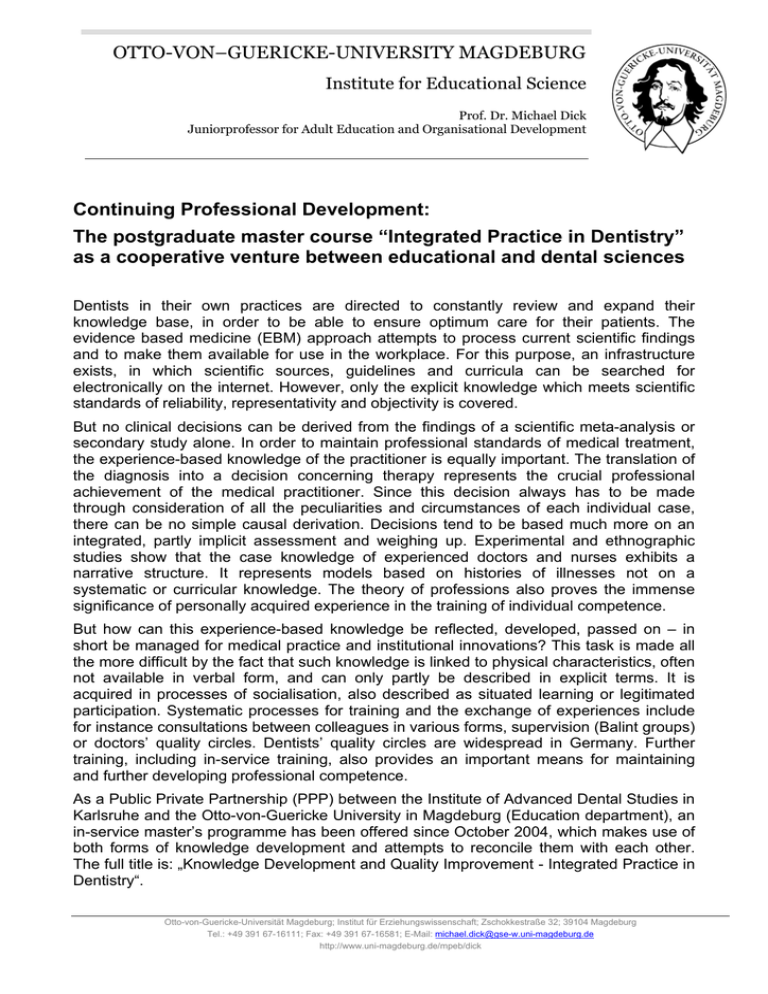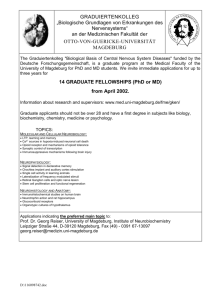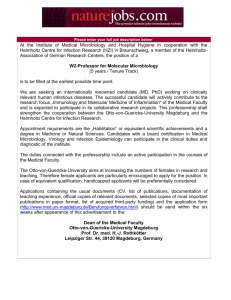Otto-von-Guericke-University Magdeburg
advertisement

OTTO-VON–GUERICKE-UNIVERSITY MAGDEBURG Institute for Educational Science Prof. Dr. Michael Dick Juniorprofessor for Adult Education and Organisational Development Continuing Professional Development: The postgraduate master course “Integrated Practice in Dentistry” as a cooperative venture between educational and dental sciences Dentists in their own practices are directed to constantly review and expand their knowledge base, in order to be able to ensure optimum care for their patients. The evidence based medicine (EBM) approach attempts to process current scientific findings and to make them available for use in the workplace. For this purpose, an infrastructure exists, in which scientific sources, guidelines and curricula can be searched for electronically on the internet. However, only the explicit knowledge which meets scientific standards of reliability, representativity and objectivity is covered. But no clinical decisions can be derived from the findings of a scientific meta-analysis or secondary study alone. In order to maintain professional standards of medical treatment, the experience-based knowledge of the practitioner is equally important. The translation of the diagnosis into a decision concerning therapy represents the crucial professional achievement of the medical practitioner. Since this decision always has to be made through consideration of all the peculiarities and circumstances of each individual case, there can be no simple causal derivation. Decisions tend to be based much more on an integrated, partly implicit assessment and weighing up. Experimental and ethnographic studies show that the case knowledge of experienced doctors and nurses exhibits a narrative structure. It represents models based on histories of illnesses not on a systematic or curricular knowledge. The theory of professions also proves the immense significance of personally acquired experience in the training of individual competence. But how can this experience-based knowledge be reflected, developed, passed on – in short be managed for medical practice and institutional innovations? This task is made all the more difficult by the fact that such knowledge is linked to physical characteristics, often not available in verbal form, and can only partly be described in explicit terms. It is acquired in processes of socialisation, also described as situated learning or legitimated participation. Systematic processes for training and the exchange of experiences include for instance consultations between colleagues in various forms, supervision (Balint groups) or doctors’ quality circles. Dentists’ quality circles are widespread in Germany. Further training, including in-service training, also provides an important means for maintaining and further developing professional competence. As a Public Private Partnership (PPP) between the Institute of Advanced Dental Studies in Karlsruhe and the Otto-von-Guericke University in Magdeburg (Education department), an in-service master’s programme has been offered since October 2004, which makes use of both forms of knowledge development and attempts to reconcile them with each other. The full title is: „Knowledge Development and Quality Improvement - Integrated Practice in Dentistry“. Otto-von-Guericke-Universität Magdeburg; Institut für Erziehungswissenschaft; Zschokkestraße 32; 39104 Magdeburg Tel.: +49 391 67-16111; Fax: +49 391 67-16581; E-Mail: michael.dick@gse-w.uni-magdeburg.de http://www.uni-magdeburg.de/mpeb/dick The programme has a modular structure and corresponds to the ECTS (7 modules, 75 CPs).Two modules serve to communicate details of current medical research in various areas of specialisation (Parodontology, Endodontia, Implantology, Orthodontia). They follow the approach of the general dentist in order to counter the widespread tendency towards specialisation with an integrated competence model with a view to providing overarching care. A transdisciplinary model is concerned with the processes and methods of a dentist’s thinking, acting and decision-making; here, scholars in the fields of humanities and medicine work together. One module, oriented towards the humanities and social sciences, deals with the role of the profession in society, the organisation of the practice and the profession, as well as questions of the economic viability of professional dental work. At the centre of the study programme there are two modules, in which practical projects are carried out in order to further quality and cooperation between colleagues. Here, theoretical questions, methodological rules and practical tasks are all directly linked with each other. Thus, for example, quality circles are implemented and reflected upon in methodological terms, quality indicators are worked out for the dentist’s own practice, made operational, collected and compared, patient surveys and team discussions are carried out and assessed. Here too, the task division between dental knowledge and educational methodology proves to be an essential condition for success. In the module “Practical Forum: Promotion of Quality in Dentistry”, experts and moderators work through three sessions with three small groups of dentists. As a result of the latter’s mutual exchange of ideas coupled with the support of the transfer of theoretical content into practice through the application of the instruments worked on, there arises an increased certainty in decision-making and the implementation of therapies: this is shown by the first qualitative evaluation studies. Finally, the study programme leads to a master’s thesis, in which the studying dentists deal with clinical as well as cross-curricular questions with methods from educational and social sciences. The subjects of graduates of the programme so far concern research into care and quality insurance, the reconstruction and assessment of dental routines, clinical studies, practice strategies, as well as the image of the dentist in culture and society. So far, 31 dentists have graduated from the programme, at present 32 more are studying. Matriculation takes place annually, the regular duration of study is four semesters. Previous achievements from other training courses can be acknowledged. The study programme is overseen by an international academic advisory board, graduates are at present founding an association to promote the aims of the degree programme. The University of Magdeburg pursues the strategy of not offering academic further education along the lines of subject curricula but rather according to the concrete needs of various professional target groups. Further study programmes include: Master of Business Administration, Master in Adult Education, Certificate in Project Management, Certificate in Knowledge Management, Certificate in European Studies. Otto-von-Guericke-Universität Magdeburg; Institut für Erziehungswissenschaft; Zschokkestraße 32; 39104 Magdeburg Tel.: +49 391 67-16111; Fax: +49 391 67-16581; E-Mail: michael.dick@gse-w.uni-magdeburg.de http://www.uni-magdeburg.de/mpeb/dick




